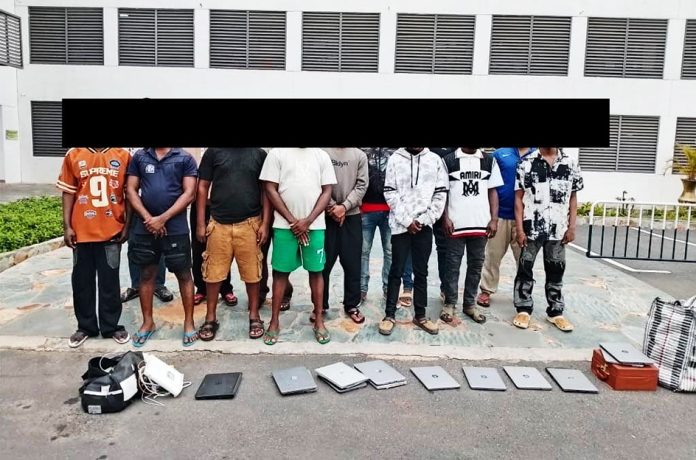Interpol has announced the arrest of 68 Ghanaians linked to sophisticated cyber fraud schemes, including romance scams and sextortion that have defrauded victims of nearly USD $450,000.
The arrests form part of Operation Contender 3.0 – a sweeping crackdown on cyber-enabled crime carried out simultaneously across 14 African countries between 28 July and 11 August 2025.
The coordinated sting targeted transnational criminal networks exploiting social media and digital platforms to manipulate and extort unsuspecting victims.
According to an official statement published by INTERPOL, Ghanaian authorities, working with the international police agency, seized 835 electronic devices, identified 108 victims and traced USD 450,000 in financial losses within the country.
About USD $70,000 of this amount has so far been recovered.
“For romance scams, the suspects had used fake profiles, forged identities and stolen images to deceive victims. The scammers extracted payments using a range of schemes, including fake courier and customs shipment fees.
“In sextortion cases, offenders secretly recorded intimate videos during explicit chats and used them for blackmail,” INTERPOL explained.
Ghana in the Spotlight
The arrests come just months after several Ghanaian youth were extradited to the United States for similar offences, deepening concerns about the country’s growing notoriety as a hub for cybercrime.
The Ghana arrests were part of a wider African crackdown that netted 260 suspects across the continent and led to the seizure of more than 1,200 electronic devices.
In Senegal, police arrested 22 suspects, dismantling a network that impersonated celebrities on social media and dating platforms.
The group defrauded 120 victims of approximately $34,000 using emotional manipulation to trick their targets. Authorities also seized 65 devices, forged identity cards, and money transfer records.
In Côte d’Ivoire, police dismantled a cybercrime ring behind mass blackmail schemes. Using fake online profiles, the group manipulated vulnerable individuals into sharing intimate photos before demanding ransom payments to prevent exposure.
Twenty-four suspects were arrested, 29 devices were seized and an astonishing 809 victims were identified.
In Angola, authorities arrested eight suspects and identified 28 victims, both domestic and international, who were targeted through fraudulent documents and fake social media identities. Similar operations unfolded in Nigeria, Benin, Burkina Faso, Gambia, Guinea, Kenya, Rwanda, South Africa, Uganda and Zambia, demonstrating the scale and sophistication of cybercrime networks across the continent.
The Numbers Behind Operation Contender 3.0
Overall, investigators identified 1,463 victims linked to these scams, estimating their financial losses at nearly $2.8 million. Police also dismantled 81 cyber infrastructures across Africa, including websites, domains and social media accounts used to host fraudulent activity.
The investigations tracked IP addresses, digital infrastructures, fake domains, and fraudulent social media profiles linked to members of scam syndicates.
Items seized included USB drives, SIM cards, forged documents and transaction records.
The operation was bolstered by collaboration with private cyber security firms Group-IB and Trend Micro, whose intelligence and data-sharing helped authorities trace scam syndicates across borders and accelerate arrests.
Global Alarm Over Africa’s Cybercrime Surge
The arrests come shortly after INTERPOL published its 2025 Africa Cyberthreat Assessment Report, which revealed that two-thirds of African countries now view cyber-related offences as a medium-to-high proportion of all crime.
The findings confirm what security experts have long warned: that digital fraud is evolving into one of the fastest-growing threats to governance, economic stability and personal safety on the continent.
Cyril Gout, Acting Executive Director of Police Services at INTERPOL, warned that the rapid growth of online platforms is fuelling new forms of exploitation.
“Cybercrime units across Africa are reporting a sharp rise in digital-enabled crimes such as sextortion and romance scams,” he said.
“The growth of online platforms has opened new opportunities for criminal networks to exploit victims, causing both financial loss and psychological harm.
By working closely with our member countries and private sector partners, we remain committed to disrupting and dismantling the groups that prey on vulnerable individuals online,” he added.
What Is at Stake for Ghana
The INTERPOL arrests highlight the urgent need for Ghana to reinforce its cybercrime laws, enhance investigative capacity, and expand digital awareness campaigns, especially among the youth who are often both perpetrators and victims.
Experts say that without decisive action, Ghana’s international reputation could suffer, with possible implications for foreign investment, fintech partnerships and even visa regimes.
“Cybercrime is not just about fraud,” the Accra-based analyst said and added, “It’s about trust. When a country becomes known as a breeding ground for scammers, it affects everything from remittances to cross-border trade.”
A Call for Action
The Ghana Police Service, working under INTERPOL’s umbrella, is expected to intensify investigations into the 68 suspects arrested, as well as track additional accomplices and money trails. Civil society groups and cybersecurity educators are also calling on government agencies to invest in digital literacy, online safety campaigns, and youth employment opportunities to reduce the lure of cybercrime.
As the dust settles from Operation Contender 3.0, one reality is clear: Ghana is at a crossroads. Its youth can either continue down the path of cybercrime notoriety or embrace the opportunities of the digital economy responsibly.









